
















A newborn essentials hospital bag is your key to a smooth, comfortable hospital experience. Based on expert recommendations and real parent experiences, here's what you absolutely need:
For Your Newborn:
For Mom:
For Your Partner:
Most hospitals provide diapers, wipes, basic toiletries, and mesh underwear, so you can pack lighter than you think. The key is focusing on comfort items and essentials the hospital doesn't supply.
As someone who experienced the overwhelming early days of parenthood firsthand, I understand how crucial it is to feel prepared for your baby's arrival. When my own newborn struggled with sleep after we brought him home, I learned that having the right newborn essentials hospital bag is just the beginning of creating comfort for your little one.
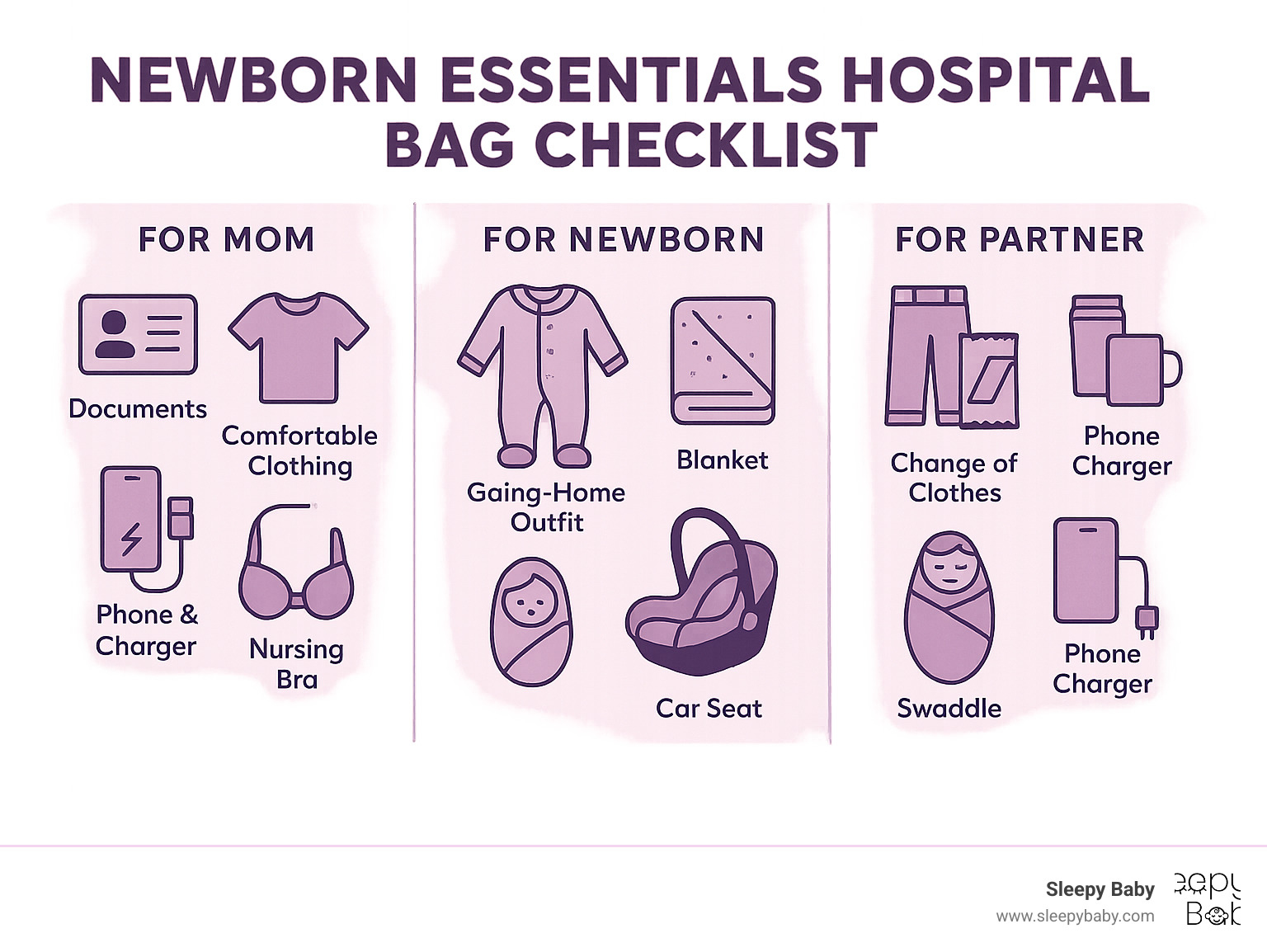
Newborn essentials hospital bag word roundup:
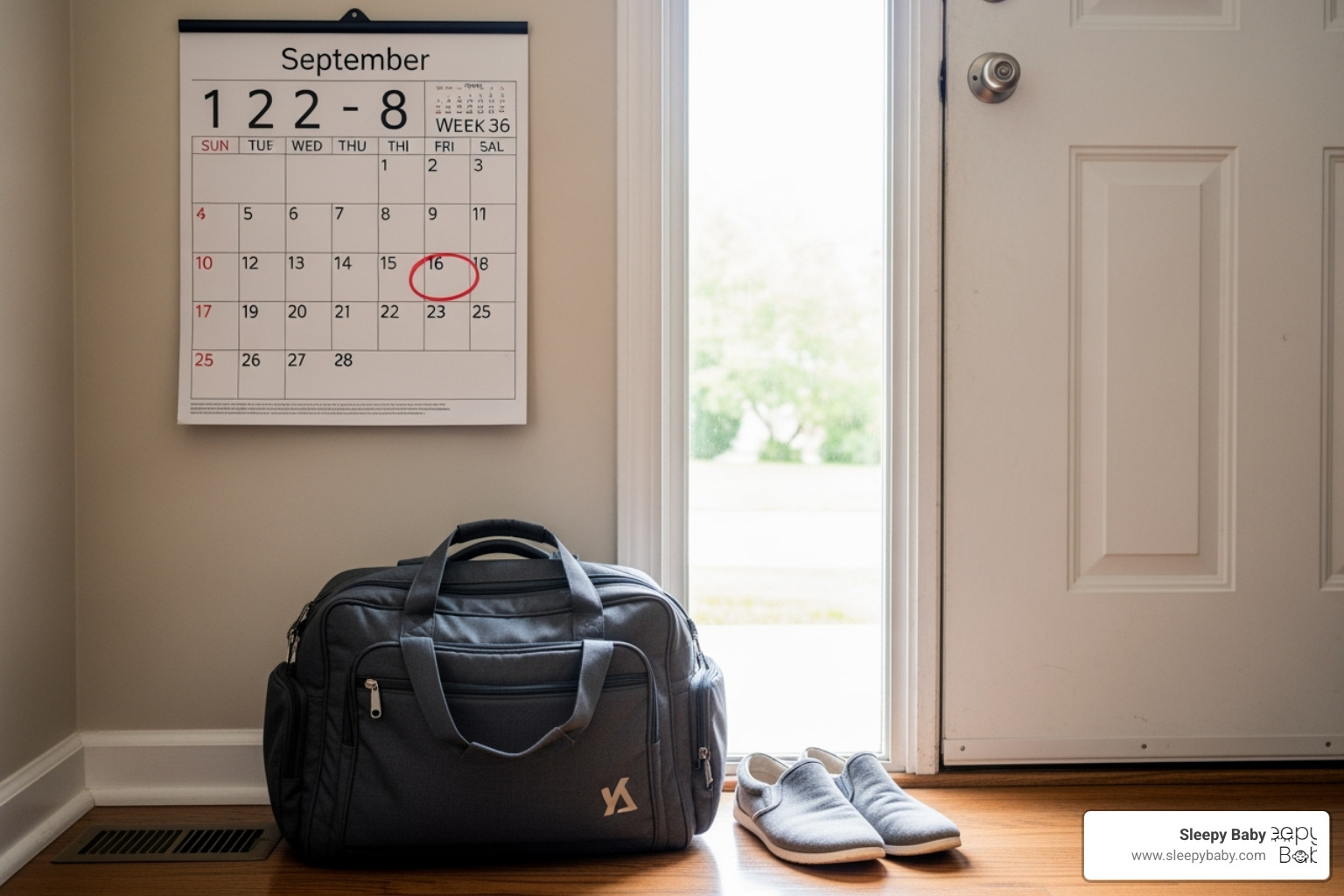
The magic moment when you finally pack your newborn essentials hospital bag feels like crossing the finish line of pregnancy preparation. But timing this milestone can feel tricky when you're balancing being ready versus not jinxing anything (we've all been there!).
Pack your hospital bag between 36 to 38 weeks – this sweet spot gives you plenty of time before your due date while ensuring you're prepared if baby decides to make an early entrance. If you have a high-risk pregnancy, your doctor might recommend packing even earlier, around 35 weeks. Only about 4% of babies actually arrive on their due date, so being prepared is always better than scrambling between contractions.
The American College of Obstetricians and Gynecologists offers helpful guidance on recognizing early labor signs, which can help you understand why packing early matters so much.
Once your bag is packed, keep it by the front door or in your car trunk – somewhere you can grab it quickly when those contractions start getting serious. There's nothing quite like the peace of mind that comes from knowing everything is ready to go.
Smart organization can save you from digging through your entire bag while you're in active labor. Many parents swear by packing two separate bags: a smaller one with labor essentials and a larger one for your postpartum stay. Packing cubes are absolute lifesavers here, keeping mom's items, baby's clothes, and partner's supplies neatly separated.
Before the big day arrives, take care of some important prep work. Pre-registering at the hospital eliminates paperwork stress when you arrive, and checking your hospital's specific policies helps you understand what they provide versus what you need to bring. Some hospitals are incredibly generous with supplies, while others expect you to bring more of your own items – knowing this ahead of time prevents both overpacking and unpleasant surprises.
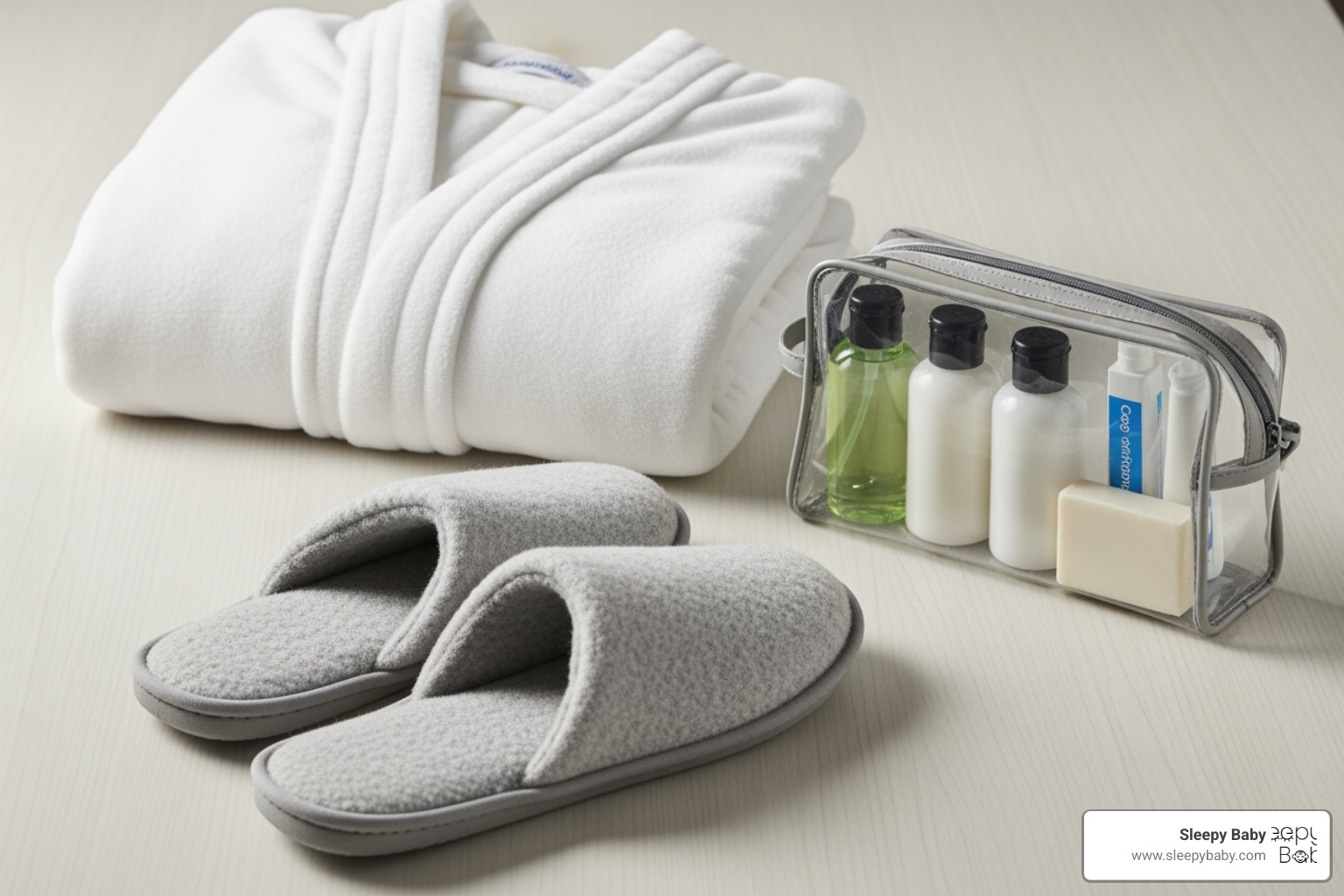
As the star of this whole show, you deserve to feel as comfortable as possible during your hospital stay. Your newborn essentials hospital bag should prioritize your comfort and recovery needs alongside baby's essentials.
Important Documents
Before we get to the fun stuff, let's tackle the paperwork no one wants to think about during contractions. Your photo ID and insurance card are absolute must-haves – hospitals won't admit you without them. Tuck in any hospital forms you've pre-filled and multiple copies of your birth plan to share with your care team. If you're taking any medications, bring a current list along too.
Labor Essentials
Labor can be unpredictable, but having the right comfort items can make all the difference. While hospitals provide gowns, many moms prefer bringing their own comfortable gown that opens in the front for easy nursing and skin-to-skin contact later.
Your lips will get surprisingly dry from all that breathing and hospital air, so lip balm becomes your best friend. Pack plenty of hair ties or silk scrunchies to keep your hair out of your face when things get intense.
Your phone will be essential for updates, photos, and staying connected, but here's a pro tip: bring an extra-long charging cable because hospital outlets are never where you need them to be! A portable power bank provides backup power when you need it most.
Postpartum Recovery
After your little one arrives, your body will be going through major changes, and comfort becomes even more important. Nursing bras that fit well and feel supportive are essential, even if you're not planning to breastfeed right away. If you are planning to nurse, nipple cream will quickly become invaluable.
While hospitals provide mesh underwear and pads, many moms find their own high-waisted underwear and heavy-duty maternity pads more comfortable. A peri bottle helps with postpartum hygiene – most hospitals provide one, but having your own ensures you get exactly what works for you.
For your going-home outfit, think loose and comfortable rather than cute. Choose something in your maternity size because your body will still be recovering. Consider investing in a postpartum recovery kit with items specifically designed to support healing.
Comfort Items
The little luxuries can make your hospital stay so much better. Pack toiletries like your favorite toothbrush, toothpaste, deodorant, and shower essentials. Slippers with grips are perfect for walking the halls safely, and a soft robe provides comfort and easy nursing access.
Here's something that can truly transform your sleep: bring your own pillow from home. Hospital pillows aren't known for their comfort, and having something familiar can help you rest better. Pack some snacks and drinks too – while hospitals provide meals, having your favorite treats nearby can be a real mood booster.
If you're planning a C-section or it becomes part of your birth story, your newborn essentials hospital bag needs a few specific additions. C-section recovery underwear sits comfortably above your incision, offering gentle support without irritation.
Pack loose-fitting clothes, especially nightgowns instead of pants, which will be much more comfortable against your healing abdomen. Some moms find an abdominal binder helpful for support, though always check with your doctor first.
Since C-section deliveries typically mean a longer hospital stay – often three to four days instead of one to two – pack extra entertainment like books, magazines, or downloaded movies to help pass the time comfortably.
For more insights on recovery and what comes next, check out More on what to expect after birth.
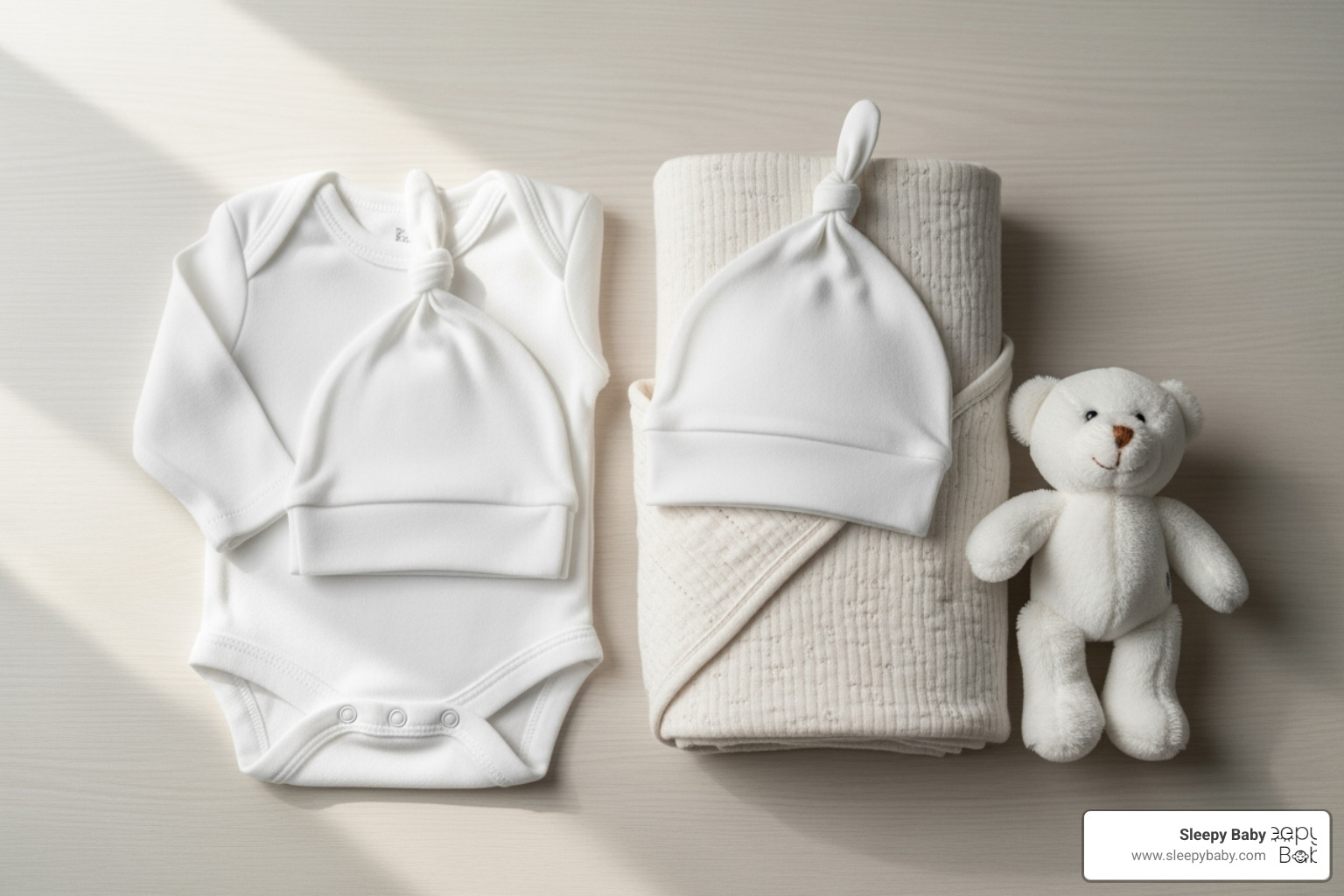
Here comes the most exciting part of your newborn essentials hospital bag - packing for your little one! While hospitals provide most of what your baby needs during their stay, having a few special items will make those first moments even more memorable and comfortable.
The star of your baby's wardrobe will be their going-home outfit - this is the outfit that will be in countless photos and mark their official entrance into the world! Choose something soft, comfortable, and appropriate for the weather. Here's a pro tip from countless parents: pack options in both newborn and 0-3 month sizes. You might think you know how big your baby will be, but they have a way of surprising us! Nothing's worse than sending your partner on a frantic shopping trip because the cute outfit you planned is too small or too big.
When selecting fabrics, think soft and gentle against your baby's delicate skin. Organic cotton or bamboo blends are excellent choices. Avoid anything with rough seams, scratchy tags, or complicated closures that might be difficult to manage with a squirmy newborn.
Beyond the going-home outfit, consider packing a couple of simple onesies or undershirts and sleepers. While hospitals typically provide basic clothing, having your own can be comforting. Don't forget socks or booties to keep those tiny feet warm, and a soft hat - newborns lose heat quickly through their heads! Scratch mittens are also surprisingly useful to prevent those razor-sharp little fingernails from leaving marks on your baby's face.
Many parents wonder about swaddle blankets. While hospitals provide them, you might want to bring one or two of your own, especially if you've been practicing swaddling techniques or have a favorite material. For more comprehensive guidance on what your little one truly needs, our Baby needs shopping guide covers everything in detail.
Good news for your newborn essentials hospital bag - you can pack light in this department! Hospitals are well-stocked with diapers and wipes, so you won't need to bring your own stash. However, if you have a preferred brand or want to test how your baby's skin reacts to different products, bringing a few samples is perfectly fine. A small tube of diaper cream is also worth including, though many hospitals provide this too.
For breastfeeding moms, a nursing pillow can be a game-changer during those early feeding sessions. Your arms will thank you during those marathon cluster-feeding periods! Lanolin cream is absolutely essential for soothing sore nipples - trust us on this one. The Six breastfeeding essentials guide provides a comprehensive overview of what you'll need for successful breastfeeding.
If you're planning to bottle-feed, whether with formula or expressed milk, check your hospital's policies first. Some "baby-friendly" hospitals may only provide formula when medically necessary, so you might want to bring your preferred brand. Most hospitals will provide bottles, but having one or two of your own isn't a bad idea.
Let's be clear: this is the most critical item in your entire newborn essentials hospital bag. Without a properly installed infant car seat, you're not leaving the hospital - period. The staff will check it, and they take this very seriously for good reason.
Here's what you need to do well before your due date: get your infant car seat professionally installed or at least inspected. Many parents think they've installed it correctly, only to find it's not as secure as it should be. Local fire departments, police stations, and certified technicians offer free car seat safety checks. The NHTSA car seat inspection website can help you find inspection stations near you.
For the ride home, especially in cooler weather, pack a warm blanket to keep your baby cozy. You can use receiving blankets to ensure a snug fit around your baby in the car seat, but remember - nothing should go under the harness straps. The blanket goes over the straps and around your baby, ensuring both safety and comfort for that very special first journey home.
Think of the car seat as more than just a safety device - it's your baby's first throne for their grand entrance into the world outside the hospital walls!
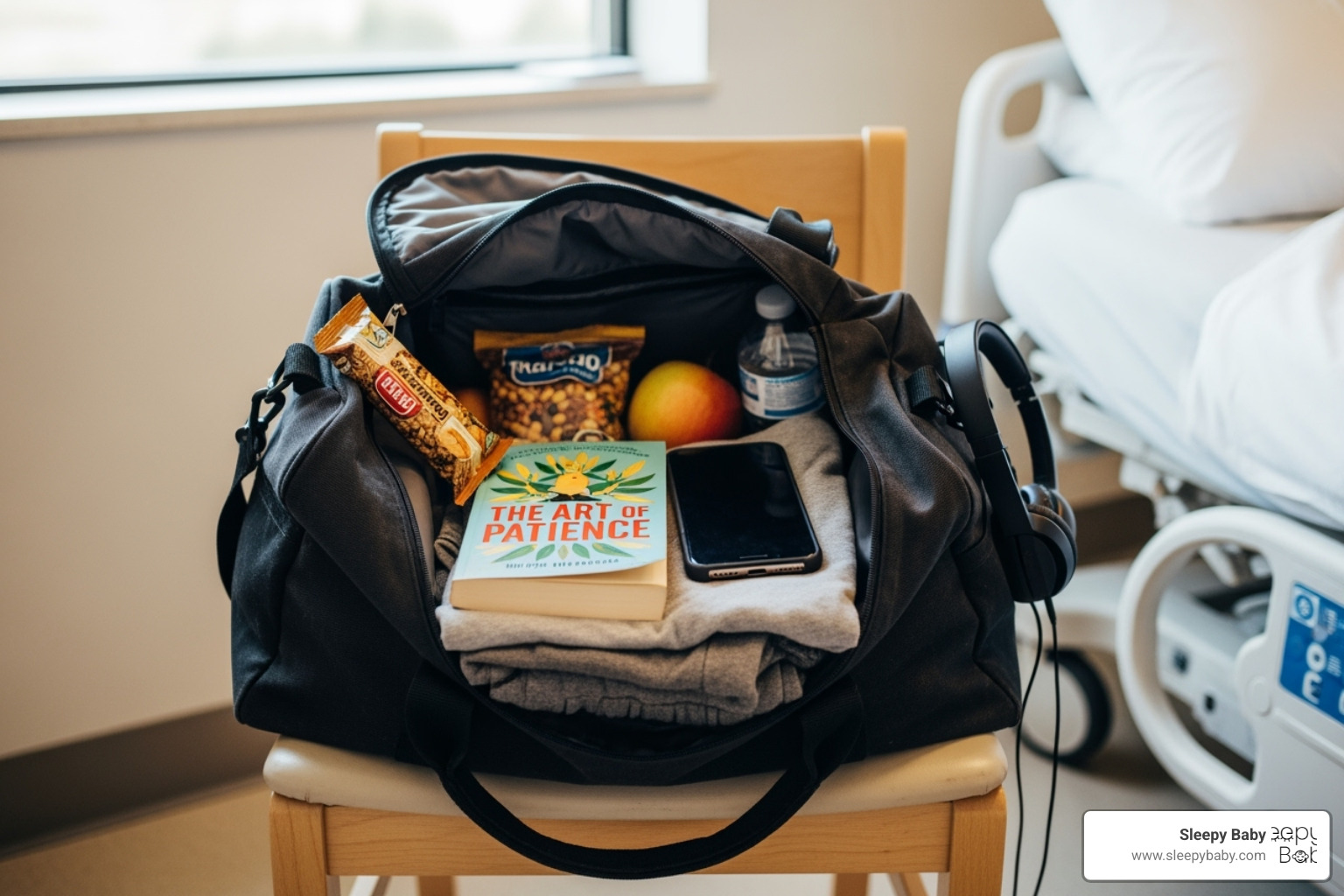
Your partner is going to be your rock during this incredible journey, so they deserve a spot in your newborn essentials hospital bag planning too! While they won't be the one giving birth, they'll be right there beside you through every contraction, every push, and every precious first moment with your baby.
Let's talk about comfortable clothes first. Labor doesn't follow a schedule, and your partner might find themselves in the hospital for 12, 24, or even 48 hours. Pack them a change of clothes and some pajamas or sweats for overnight stays. Trust me, they'll thank you when they're trying to catch some sleep on that hospital chair that definitely wasn't designed for comfort.
Don't forget their toiletries – nothing makes a long hospital stay feel more manageable than being able to brush your teeth and freshen up. Include their personal medications too, because the last thing anyone needs is a partner with a headache or other discomfort when you need them most. Their phone and charger are absolute essentials for keeping family updated and capturing those first precious photos.
Here's where things get really important: snacks. Your partner is going to be your support system, running errands, advocating for you, and staying alert through potentially long hours. Hospital cafeterias aren't always open, and vending machine options can be pretty grim. Pack a variety of filling, non-perishable snacks and a reusable water bottle. Throw in some cash or change for vending machines too – they'll inevitably need something at 2 AM when everything else is closed.
For those quieter moments during early labor, some entertainment can be a lifesaver. A book, tablet, or headphones will help them stay relaxed and occupied without disturbing your rest. Speaking of entertainment, if you're looking for ways to celebrate this new chapter together, check out our ideas for Great gifts for new dads.
Finally, pack them their own pillow and blanket for comfort. Hospital furniture isn't known for being cozy, and your partner needs to be well-rested to be the best support they can be. A familiar pillow can make all the difference when they're trying to grab a few hours of sleep between caring for you and marveling at your new little one.
It's easy to get carried away when packing your newborn essentials hospital bag, but knowing what the hospital typically provides can help you pack smarter and lighter. Understanding this balance will save you from lugging unnecessary items and help you focus on what truly matters for your comfort.
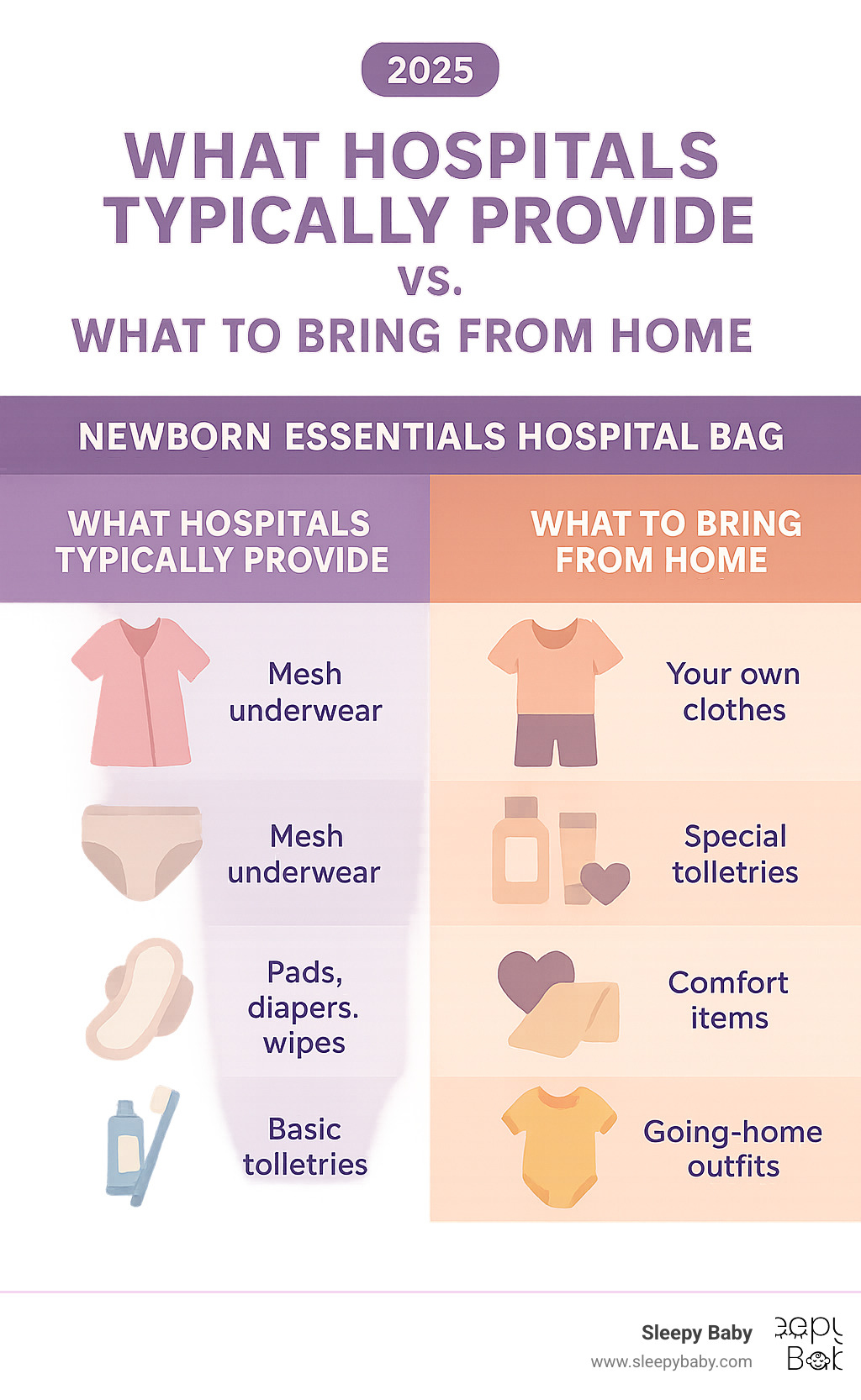
Most hospitals are surprisingly well-equipped for your stay. For you as the new mom, they'll provide hospital gowns that open in the front for easy nursing access and grip socks to prevent slips during those first walks around the ward. The disposable mesh underwear might not win any fashion awards, but it's incredibly practical for postpartum recovery and you can take extras home.
You'll also receive perineal pads for postpartum bleeding and peri bottles for gentle hygiene care. Many hospitals stock basic toiletries including soap, shampoo, and even a toothbrush, though you might prefer your own familiar brands. Some hospitals go the extra mile with birthing balls for labor comfort and ice packs for recovery.
For your precious newborn, hospitals are well-stocked with diapers in both newborn and size 1, along with basic wipes for diaper changes. They provide flannel swaddle blankets and baby hats to keep your little one cozy. Baby-friendly hospitals often have formula samples available if medically necessary, though they prioritize breastfeeding support.
While the urge to pack everything is real, there are definitely items that shouldn't make it into your newborn essentials hospital bag. Valuables like expensive jewelry (yes, even your wedding ring if it's valuable), large amounts of cash, and electronics like laptops are best left at home. Hospitals can be hectic places, and you don't want to worry about losing precious items during this special time.
Skip bringing your own diaper stash – the hospital provides plenty for your stay, and you'll have enough to carry home as it is. While you'll want a few outfit changes, avoid too many clothes for yourself or baby. You'll likely be in a hospital gown for most of your stay, and your baby will spend most of their time swaddled in hospital blankets.
Medical equipment should stay home unless specifically instructed by your doctor. The hospital has everything needed for your care, and bringing your own devices could interfere with their protocols. Large amounts of baby gear like strollers or bouncy seats aren't necessary either – save room in your car for the trip home with your new family member!
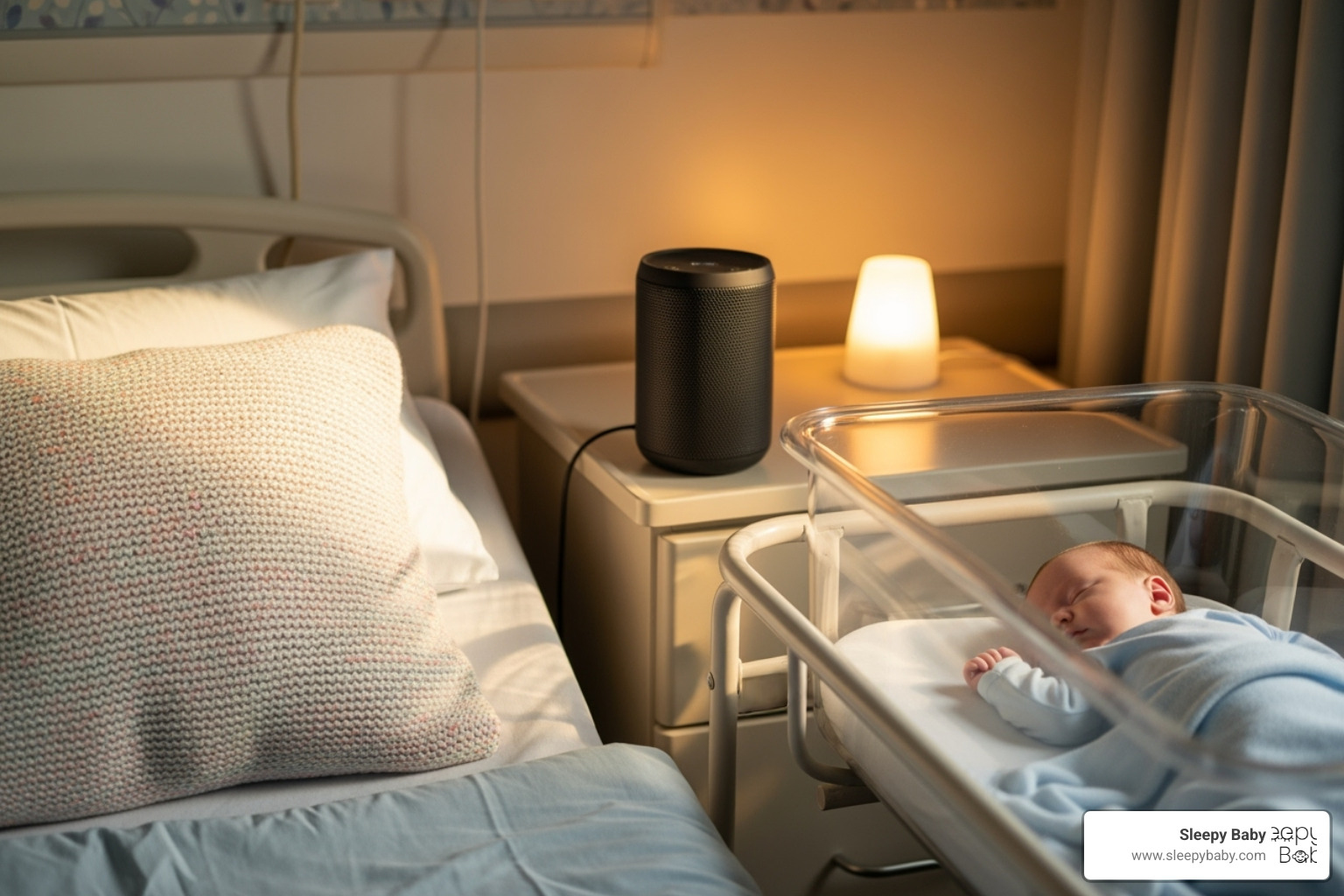
While the essentials will get you through your hospital stay, a few thoughtfully chosen comfort items can transform your experience from manageable to truly restful. These optional additions to your newborn essentials hospital bag focus on creating a more peaceful environment for both you and your baby.
Hospital beds aren't exactly known for their luxury, so your own pillow can make all the difference when you're trying to recover and get some rest. Pair it with a cozy blanket from home to create a familiar, comforting space in an otherwise clinical environment.
Hospitals never truly sleep - there's always some light filtering in and sounds from the hallway. An eye mask and earplugs can be absolute lifesavers for catching those precious moments of rest between feedings and check-ins. If you find music or podcasts soothing, a small portable speaker allows you to create your own calm atmosphere without disturbing other patients.
For those who use aromatherapy, a small, battery-operated essential oil diffuser might provide comfort, but always check with your hospital first about their scent policies. Some facilities have strict rules about fragrances due to other patients' sensitivities.
Don't forget about capturing memories! Special announcement props or milestone cards can make those first photos even more special, and a baby book gives you somewhere to record all those precious first details you'll want to remember forever.
Your newborn is adjusting to a completely new world outside the womb, and the hospital environment can be overwhelming with its bright lights and constant activity. A few comfort items can help ease this transition and promote better rest for everyone.
Portable sleep aids that provide rhythmic tapping can be incredibly soothing for newborns. These devices mimic the gentle patting motion of a caregiver's hand, offering consistent comfort without requiring you to stay awake patting your baby yourself. This hands-free approach can be especially valuable during those exhausting first days when you need rest too.
If you're considering white noise, choose carefully. While some older white noise machines can be unsafe due to high decibel levels, modern safety-rated devices are designed to provide soothing sounds at safe, low-decibel levels. Some are even designed for chest placement, offering gentle vibration and sound that can help your baby feel secure and calm in the unfamiliar hospital environment.
Pacifiers can provide additional comfort for babies who enjoy sucking for soothing, even if you're planning to breastfeed. Many lactation consultants actually recommend waiting a few weeks before introducing pacifiers, but having them available gives you options if your baby seems to need extra comfort.
For those special first moments, consider packing items for memory-making. Beyond photos, you might want to capture your baby's tiny footprints in their baby book or create announcement cards right there in the hospital room.
These comfort items aren't necessary for survival, but they can make your hospital stay more pleasant and help establish good sleep habits from day one. For more ideas on thoughtful and practical infant items, check out our guide to More on useful infant gifts.
Take a deep breath – you've done it! Your newborn essentials hospital bag is packed, organized, and ready to go. While putting together this checklist might have felt overwhelming at first, you're now far more prepared than most expectant parents. You've thought through every detail, from those crucial documents to your partner's favorite snacks, and that preparation will pay off when you're walking through those hospital doors.
This isn't about having the perfect bag – it's about feeling confident and ready for whatever your birth experience brings. Whether you end up using every single item or just a handful, knowing you're prepared means you can focus on what really matters: welcoming your little one into the world.
Your hospital bag represents just the beginning of creating comfort and security for your new baby. As you prepare for those first precious days, it's worth thinking ahead to the weeks and months that follow. The transition home from the hospital can bring its own challenges, especially when it comes to sleep.
That's where we come in. At Sleepy Baby, we understand that those early days can be both magical and exhausting. Our portable sleep aids are designed to extend the comfort your baby felt in the hospital, using gentle rhythmic tapping that mimics a caregiver's soothing touch. Combined with safe, low-decibel white noise, these tools can help your newborn settle into peaceful sleep patterns from day one.
The beauty of starting these comfort routines early is that they grow with your baby, promoting the independent sleep skills that will benefit your entire family. While you're packing that hospital bag, you're already thinking like the thoughtful parent you're about to become.
Explore our newborn sleep solutions to prepare for peaceful nights ahead and find how the right tools can make those first weeks at home just as comfortable as your well-planned hospital stay.